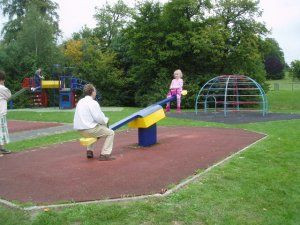Overprotective Parents May Impede Children's Ability to Play

Overprotective parents may prevent children from getting good exercise, according to North Carolina State University researchers who examined how families use neighborhood parks.
Children who were monitored too closely by hovering parents were less likely to engage in higher levels of physical activity, the study found. The research appears in the American Journal for Preventive Medicine.
“Many parents are worried about the safety of their children, so they tend to hover,” said Dr. Jason Bocarro, associate professor of parks, recreation and tourism management at NC State.
Major factors of concern for researchers are that hovering parents are keeping children from running, playing actively with their friends and neighbors. Instead children are sitting in front of a computer or T.V., which increases the risk of obesity. Currently, childhood obesity rates in the United States have increased to approximately 17 percent or 12.5 million, according to the CDC.
The research showed that formal programs and facilities such as soccer and basketball courts increase the likelihood of children engaging in higher level of activity. Also, the presence of one or two children with higher physical activity levels will increase those levels in other kids. The study additionally found that girls were less likely to be observed in parks playing, and less likely to be observed in higher levels of physical activity.
In the study, group of trained observers from NC State systematically examined neighborhood parks around Durham, N.C. to record activity levels.
"We chose to study parks because they have been identified by studies as critical spaces within communities to help children stay active. They are free and accessible and provided an opportunity to engage underserved and lower-income populations, whom data have shown have higher likelihood of being classified as 'inactive' and obese," said Boccaro.



























